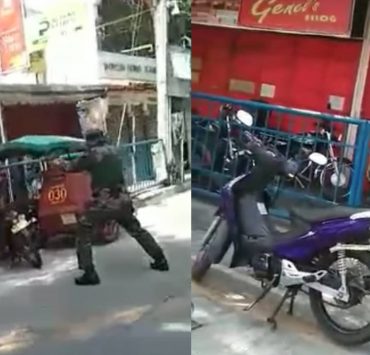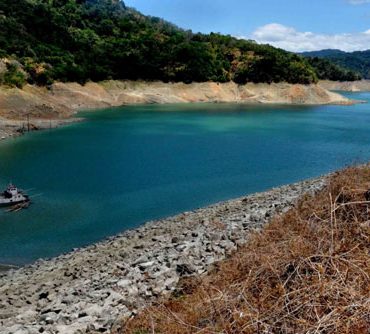Last Apr. 20, the Office of the Vice-President (OVP) started the distribution of the first batch of locally produced Personal Protective Equipment (PPE)in partnership with Filipino designers Mich Dulce and Joey Socco to select Metro Manila hospitals. With its accumulated donations, the partnership is set to produce over 5,000 locally made suits through the recently established Manila Protective Sewing Club—a group of volunteers from the fashion industry and at-home citizens helping to produce PPEs for frontliners who face non-critical to critical exposure.
[READ: OVP starts delivery of free locally produced protective suits to Metro Manila hospitals]
Led by Mich Dulce, the PPEs produced by the club are patterned according to a technical pack developed by Kendi Maristela. Socco then constructed a prototype using a material called Taffeta SBL (silver back lining) which was inspected and approved by infectious diseases specialist Dr. Jesus Julio Ancheta.
In an effort to encourage more people to join the initiative and to be able to produce their own PPEs, a downloadable file of the design along with instructions have been made available in the club’s official Facebook group.
https://www.instagram.com/p/B-b0zpIhVUu/
But while this serves as a promising breakthrough (especially given the shortage of PPEs), last Sunday Apr. 19, Dulce revealed in a Facebook post that a number of people have been using the said patterns to profit off substandard, dysfunctional protective suits.
[READ:First approved protective suit prototype for medical frontliners to go full steam into production]In the post she captions a video of a sample PPE material from a scammer saying: “I’ve been feeling so sad and upset for a week now because I feel like I gave birth to the devil with the amount of scammers using the techpack we worked on.” The video then shows water seeping into the material–something that obviously shouldn’t happen to PPEs.
https://www.facebook.com/783485704/posts/10163183726905705/?d=n
In light of such incidents, we reached out to Dulce and Maristela to help provide general guidelines for people who are looking to buy locally-produced PPEs:
Ask for a water test
First and foremost, before you even confirm your purchase, you need to ask for a water test or a demonstration (just like in the video) of the material being run through or exposed to water. It is very crucial that you make sure the suit you will be buying is actually impermeable to water because regardless if it’s for non-critical or critical exposure, if water can still pass through it, it’s NOT a PPE and will defeat the purpose of protecting our frontliners.
Inspect the suit’s material and structure
A lot of these sellers when asked about the material will say that the fabric they used is taffeta. However, it is crucial that you make them specify which kind of taffeta since not all of them are water repellent or waterproof. Manila Protective Gear Sewing Club specifically uses taffeta with SBL and this is mainly what you should expect for locally-produced, alternative PPEs. And again, this is where the water test becomes crucial.
What’s more is that the club really stayed true to every design detail and construction of an actual isolation suit when we were doing the replication thus, you should also look out for suits which structure are quite different from the designs put out. For example, Kendi Maristela shares that they seen alternative suit designs which come with an elastic to cinch the waist not taking into account how this could make it difficult to remove the suit.
Be wary of sellers claiming association with the OVP or other organizations
A shop or someone selling PPEs claiming to be affiliated with Mich Dulce or Vice-President Leni Robredo is questionable because no one is affiliated with Manila Protective Gear Sewers Club unless they’re directly transacting with Ms. Dulce and are providing PPEs free of charge.
Cost
Although the partnership doesn’t really need to put out cash since they are running on donations, a standard suit’s estimated cost is P450. And so, another thing to look out for is the price of a certain PPE variation. Dulce points out that if it’s too cheap, there may be something wrong and if it claims to be locally-made but costs more than 450 (much like the scammers using their designs and are selling them for P650-P850), you should be aware that there’s profit in one way or another.
Claims of being “Medical Grade”
“The minute they say it’s medical-grade Taffeta SBL, they’re lying because medical grade isn’t made out of taffeta. If it’s made in the Philippines it’s most likely not going to be medical grade unless it’s made by CONWEB who were appointed by DOH and DTI,” said Dulce.
This is due to clarification that while the suit was approved for use by medical professionals exposed to patients with the coronavirus, it is not a medical-grade suit, because the term requires production using sterile equipment in a sterile environment.
Inspect its package’s label
Make sure that the alternative PPEs you’ve acquired are properly labelled with it specifying that it’s “nonmedical grade”, the fabric used, its size as well as its manufacturers.
Ask a lot of questions
Overall, considering the virus’ highly contagious nature, everyone looking to purchase any form of protective gear from unofficial sources should take it upon themselves to relentlessly inquire about what they will, not only be paying for, but also what would be a person’s literal shield against the virus.
“I understand that people are desperate and they want to help and so they want to buy [PPEs] to make sure that doctors are protected, but if you’re buying the wrong kind of material and the wrong kind of suit then your doctors are actually at risk,” said Dulce.
If you have further questions, you may send an email to: [email protected] or reach out to their hotline at 0906-4746084. You can donate fabric and material to be used for the production of PPEs by contacting Cynthia Diaz at 0917-8662496 and deposit donations to the following accounts: BPI Savings Account no. 416 959 1143 (Stephanie Tan), GCash Account no. 0906 474 6084 (Stephanie Tan).
Get more stories like this by subscribing to our weekly newsletter here.
Read more:
Here are the organizations you can donate to as we battle the COVID-19 pandemic
DOT’s free hospital shuttle services are now on Google Maps
Face masks (alone) can’t save you and it’s also killing the environment
Writer: JOY THERESE GOMEZ




